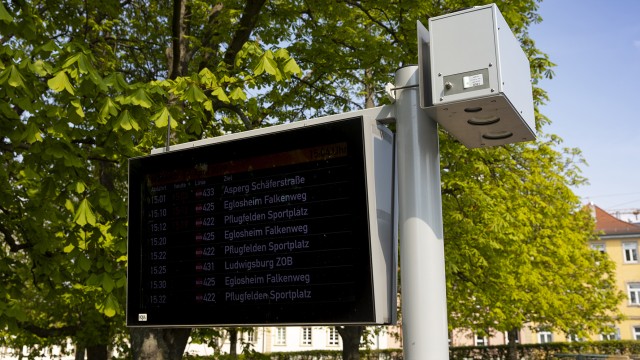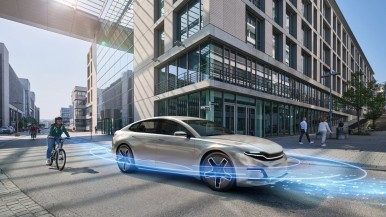Mobility management at Bosch
E-bike leasing: On average, half of all commuters in Germany travel less than ten kilometers to work. Bosch is helping its associates make the transition from four wheels to two with a subsidized bike-leasing scheme. On offer are conventional bicycles as well as e-bikes from some 4,000 dealerships. Bosch then handles all of the paperwork for a lease that includes insurance and inspections. The scheme is financed by a deferred compensation tax model with Bosch paying the first installment. The company then deducts subsequent installments from associates’ gross salary, which means they also enjoy a tax advantage. The program has caught on: more than 9,000 bicycles and e-bikes have been leased to date, including 1,500 in the greater Stuttgart area alone.
Carpooling: Carpools are a great way to significantly reduce the number of cars on the road and improve air quality. Bosch helps its associates form carpools using its internal Bosch Connect platform. Associates can also share the commute to work with the help of the ridesharing platform SPLT, which Bosch acquired in 2018. After recently being introduced in Mexico, the platform is now being launched in the Stuttgart metropolitan area, where some 55,000 Bosch associates travel a combined distance of 1.5 million kilometers every day.
Telecommuting: Thanks to a comprehensive telecommuting policy, Bosch associates are free to work from home or at a Bosch location closer to their home as the need arises. Associates may also opt for flextime to avoid rush-hour traffic and take advantage of more convenient public transportation connections. One in five Bosch associates in the Stuttgart area works from home for one day per week on average.
Opting for public transportation when air pollution is high: Bosch associates have been able to use their company ID as a free ticket for Stuttgart’s public transportation network on days when fine particulate levels are high and the city issues an air quality alert.
Shuttle buses: Bosch also operates shuttle buses for its associates working at locations such as Istanbul in Turkey, Curitiba and Campinas in Brazil, Changsha, Beijing, Shanghai, and Suzhou in China, and Stuttgart in Germany. The ten long-haul and seven short-haul buses in Shanghai, for example, together carry more than 1,000 passengers a day.
Bosch innovations under the hood
48-volt powertrain: Bosch has developed a 48-volt powertrain system tailored for urban mobility and featuring a finely tuned package of electric motor, ECU, battery, charger unit, display, and app. Bosch is thus making urban mobility more efficient. On top of that, rapid acceleration from a standstill makes for a “wow” factor. Whether two, three, or four wheels, this system is available for all classes of light electric vehicles. As it is made up of off-the-shelf automotive components, manufacturers will have the benefit of production-tested parts and minimal development expense. This gives both established automakers and new players the opportunity to launch vehicles within 12 to 18 months.
Electromobility: Bosch wants to be the go-to partner for electric driving, and to be the leader in the mass market for electromobility that will emerge after 2020. In the electromobility business, no automotive supplier is as broadly diversified as Bosch – from bicycles to trucks. The company’s electric powertrain components already feature in more than a million vehicles around the world. Its portfolio ranges from power electronics, 48-volt mild hybrid batteries, and electric motors to electric axle systems.
iDisc: A new brake disc from Bosch is helping to tackle the problem of particulate matter pollution in cities. The iDisc generates 90 percent less brake dust than a conventional brake disc. On top of that, its tungsten carbide coating reduces wear and increases reliability. The iDisc is suitable for all types of vehicle, from electric cars to vans and trucks.
New diesel technology: Bosch continues to advance the state of the art in diesel technology. The company has managed to cut diesel vehicles’ NOx road emissions to well below the statutory limit that will take effect in 2020. It achieved this result using a sophisticated combination of engine and exhaust-gas treatment in which thermal management plays a pivotal role.
Regenerative braking: Bosch’s regenerative braking systems are key components of hybrid and electric vehicles. They extend electric vehicles’ range and reduce brake dust emissions by more than 95 percent. When vehicles equipped with these systems brake, their kinetic energy is recuperated and stored in a high-voltage battery for the electric motor to use. With conventional vehicle, most of this energy dissipates into the environment.
Bosch technology beyond the hood
Community-based parking: Drivers looking for a place to park account for around a third of city traffic. Bosch’s community-based parking simplifies the search for a suitable spot. The vehicle uses the parking assist system’s ultrasonic sensors to identify and measure the gaps between parked cars as it drives past. The system uploads the collected data to a digital parking map in real time for all connected cars to access. Drivers can then simply let themselves be guided straight to the nearest free space.
COUP: Bosch’s e-scooter sharing service provides emission-free local transportation to users in Paris, Madrid, and Berlin. The COUP fleet count stands at 5,000 e-scooters. Anyone 21 years or older with a Class B or international driver’s license is welcome to use the service. Finding the nearest e-scooter is an exercise in convenience with the service’s app. Reserve, pay, and set off – no key required. A helmet and two spare batteries are located under the seat. COUP recharges the batteries; customer don’t need to worry about anything. Powered by green electricity, these scooters travel at speeds up to 45 kph and may simply be parked after use in designated zones within the area served by COUP.
Air-pollution measurement system: Air quality is usually only measured at a few locations with large and expensive stationary equipment. Despite this, the readings from a single measurement point are often used to generalize about air quality across the entire city. To better understand the relationship between different emissions sources and the environment, Bosch has developed a new air-pollution measurement system. The compact boxes can be flexibly deployed around urban areas, for example mounted on streetlights or bus shelters. They measure particulate matter and nitrogen dioxide as well as temperature, pressure, and humidity in real time. Bosch creates an air-quality map on the basis of this data and uses it to advise German and international cities on traffic planning and management. In Stuttgart, at Germany’s busiest traffic junction, the company demonstrated that maintaining a steady flow of traffic can reduce the existing fleet’s pollutant emissions by as much as 20 percent.
moveBW: This mobility assistant app provides a digital traffic management service for urban areas. Headed up by Bosch and based in Stuttgart, the mobility platform intelligently plans journeys that link and flexibly combine all modes of transportation. moveBW considers individual wishes as well as collective needs in its traffic management. Designed to avoid traffic jams, the app guides commuters to the nearest park-and-ride location. Unlike conventional routing applications, moveBW has access to municipal traffic data. With real-time access to information, it is able to provide extremely precise routing recommendations.
Triffix: This Bosch startup’s eponymous app transmits rapid, route-specific traffic reports. Drivers only receive traffic updates that are relevant to their itinerary. The startup’s partnership with the Stuttgart traffic control center allows it to provide real-time alerts about events such as accident-induced traffic jams. Instant messages pushed to smartphones enable drivers to better plan alternative routes and avoid lengthy traffic jams. A second pilot phase is currently underway in Stuttgart.





